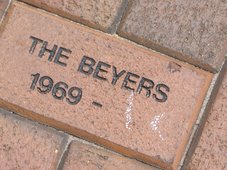Monday, June 6, 2011
Thinking big
This column originally appeared in Capital Business on June 6:
What would you do if you knew you couldn’t fail?
That’s a rhetorical question we toss around the house, to inspire our kids to aim high and take chances.
Of course, the difference between being fearless and foolhardy can be small.
I was thinking about that threshold last week while attending an awards banquet for the region’s chief financial officers, hosted by the Northern Virginia Technology Council. (Capital Business was the media sponsor.)
More than other corporate officials, CFOs often have to assess risks and confront difficult choices. The good ones seem to know how to help their companies do the spectacular while avoiding the reckless.
I’m fascinated by how companies manage that push and pull. Executive engagement is often key.
At the NVTC event, Nigel Morris, one of the co-founders of the McLean financial giant Capital One, was honored for his contributions to the region’s technology business community.
“I’ve often wondered,” he said, “how much of Capital One’s success is due to luck and how much is due to being good.”
One piece of good fortune: The former Signet Bank out of Richmond was willing to take a chance on some no-name business strategists who were tinkering with ways data could be used to inform lending decisions.
Morris also credited the business acumen of his co-founding partner Richard D. Fairbank, who started in 1988 and remains the chief executive today.
Fairbank, he said, was a tireless “advocate for the best of human capital.”
And the secret for hiring the best? More than benefits and salaries, Morris said he learned that what most people want is “to be part of something bigger.”
Capital One certainly became that. When Morris retired in 2004, his start-up had become a public company valued at more than $20 billion. He now occupies himself with his family foundation in Alexandria and serves as managing partner of QED Investors, a firm that invests in companies that are trying to “solve a pain point for consumers.”
Morris is no passive bystander in the companies he assists.
“We are operators masquerading as investors,” Morris said.
Pushing them to think big, no doubt.
What would you do if you knew you couldn’t fail?
That’s a rhetorical question we toss around the house, to inspire our kids to aim high and take chances.
Of course, the difference between being fearless and foolhardy can be small.
I was thinking about that threshold last week while attending an awards banquet for the region’s chief financial officers, hosted by the Northern Virginia Technology Council. (Capital Business was the media sponsor.)
More than other corporate officials, CFOs often have to assess risks and confront difficult choices. The good ones seem to know how to help their companies do the spectacular while avoiding the reckless.
I’m fascinated by how companies manage that push and pull. Executive engagement is often key.
At the NVTC event, Nigel Morris, one of the co-founders of the McLean financial giant Capital One, was honored for his contributions to the region’s technology business community.
“I’ve often wondered,” he said, “how much of Capital One’s success is due to luck and how much is due to being good.”
One piece of good fortune: The former Signet Bank out of Richmond was willing to take a chance on some no-name business strategists who were tinkering with ways data could be used to inform lending decisions.
Morris also credited the business acumen of his co-founding partner Richard D. Fairbank, who started in 1988 and remains the chief executive today.
Fairbank, he said, was a tireless “advocate for the best of human capital.”
And the secret for hiring the best? More than benefits and salaries, Morris said he learned that what most people want is “to be part of something bigger.”
Capital One certainly became that. When Morris retired in 2004, his start-up had become a public company valued at more than $20 billion. He now occupies himself with his family foundation in Alexandria and serves as managing partner of QED Investors, a firm that invests in companies that are trying to “solve a pain point for consumers.”
Morris is no passive bystander in the companies he assists.
“We are operators masquerading as investors,” Morris said.
Pushing them to think big, no doubt.
Subscribe to:
Post Comments (Atom)





No comments:
Post a Comment